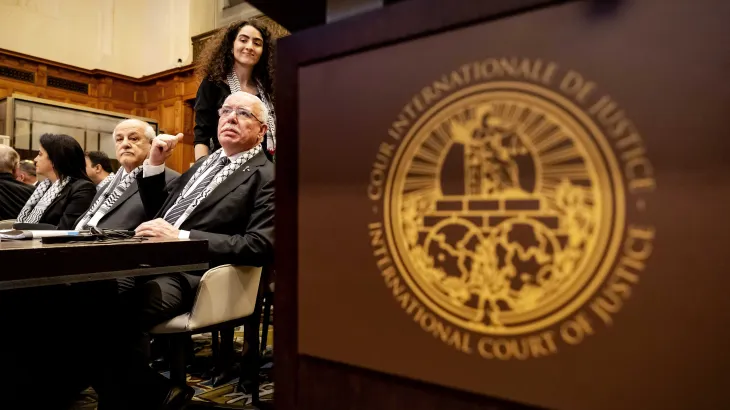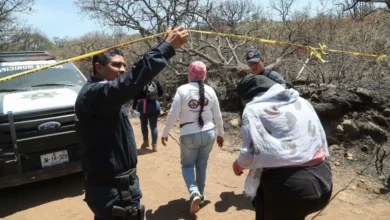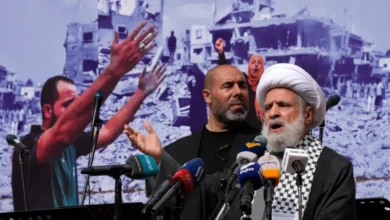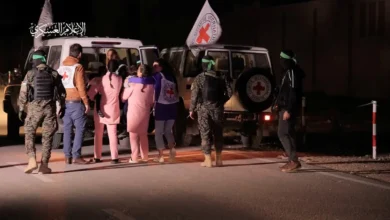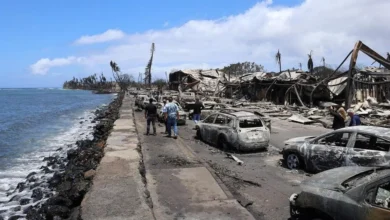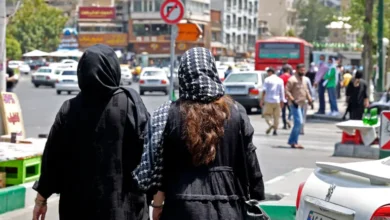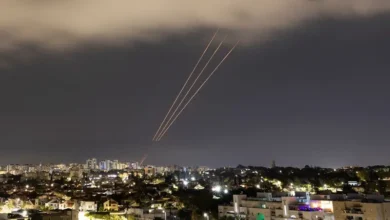Political analyst Gideon Levy says he’s “afraid” the ICJ case will have little impact on Israel’s policies towards the Palestinians as it regularly ignores international rulings and condemnation.
“But it depends a lot on the international community. A ruling without any practical steps – Israel can easily ignore this,” Levy told Al Jazeera.
He highlighted the 2004 World Court opinion that the Israeli separation barrier is illegal. “Do you think the barrier is not there anymore? It’s there, kicking and alive, and the same will be for the apartheid if the world does not take practical measures.”
He called the latest ICJ case “the beginning; now, we must see”.
“The only question is if the world will be able to move from recrimination and condemnation into actions,” said Levy.
Morning hearing comes to an end
This morning’s hearing is over and the court is adjourned. The afternoon session will convene at 3pm (14:00 GMT) to hear Belize, Bolivia, Brazil and Chile.
The ICJ so far heard the legal arguments presented by South Africa, Algeria, Saudi Arabia, the Netherlands, Bangladesh and Belgium.
Israel’s settlements aim to bring permanent demographic change
Belgium’s legal expert Vaios Koutroulis focused on Israel’s settlement policy and its legal implications.
- Belgium condemns the use of violence against the Palestinian population and wishes to highlight Israel’s obligations to put an end to violence and bring to justice the perpetrators.
- Israel’s settlement policy aims to bring about a permanent alteration of the demographic composition of the Palestinian territory and the status of the Palestinian territory itself.
- This policy is in violation of fundamental rules of international law: the prohibition of the acquisition of territory by force; the principle of self-determination.
- The establishment of settlements is also linked to the establishment of two different systems: one for the settlers and one for the Palestinian population.
- Israel must end all settlement activity and restore all property expropriated. Third states must not recognise the situation as legal, must not render aid and must cooperate to end violations.
-
More on arguments presented by Bangladesh
The representative of Bangladesh recommended that Israel and the international community act as follows:
- Israel must cease all acts preventing the exercise of the right to self-determination of the Palestinian people, including signing discriminatory laws and measures. It must also withdraw its forces and dismantle illegal structures of occupation.
- Israel must provide reparations for the damage caused and guarantee non-repetition.
- All states must ensure the cessation of any legal impediment to the right of self-determination and uphold the prohibition of acquiring territory by force.
- States must not recognise the illegal situation resulting from Israel’s wrongful acts, including in East Jerusalem, and must not provide aid or assistance. Cooperation is essential to ensure Israel’s abidance by international law.
-
One can only hope the Saudi position at the ICJ is the same as the one Saudi Arabia makes to the United States and Israel in the future.
Because in the back corridors of power, we hear in the Western and Israeli media that Saudi Arabia is eager to normalise relations with Israel, that it’s more than happy just to sidestep the Palestinian issue, that all it says regarding the Palestinian question is lip service.
In the context of Gaza, in the context of genocide, in the context of Israel and the Middle East, in the context of the widening of the war, we can only talk of the US backing of Israel. Because without it, Israel would not have been able to carry out genocide, and it would not be able to stand up to the international community as we see it today at The Hague.
- The UN Security Council should consider further action to end the occupation. Immediate action is necessary to end the system of apartheid.
Without US backing, Israel wouldn’t be allowed to commit ‘genocide’
-
-
One can only hope the Saudi position at the ICJ is the same as the one Saudi Arabia makes to the United States and Israel in the future.
Because in the back corridors of power, we hear in the Western and Israeli media that Saudi Arabia is eager to normalise relations with Israel, that it’s more than happy just to sidestep the Palestinian issue, that all it says regarding the Palestinian question is lip service.
In the context of Gaza, in the context of genocide, in the context of Israel and the Middle East, in the context of the widening of the war, we can only talk of the US backing of Israel. Because without it, Israel would not have been able to carry out genocide, and it would not be able to stand up to the international community as we see it today at The Hague.
Israel cannot rely on self-defence to justify its actions
The representative of Bangladesh, Riaz Hamidullah, stressed the principle of self-defence does not offer legal grounds for prolonged occupation.
- Israel’s occupation runs counter to three basic tenants of international law: the right to self-determination; the prohibition to acquire territory by force; and the prohibition of racial discrimination and apartheid.
- As mandated by international law, any occupation must be temporary and acquiring territory is illegal. Israel’s prolonged occupation, coupled with the acquisition of territory, violates international law.
- The right to self-defence does not justify the violation of international law, including the right to self-determination. Israel cannot rely on self-defence to justify its actions.
- There is broad consensus that Israel, through its denial of self-determination of the Palestinian people, has violated peremptory norms of international law while also hindering the prospects for a just and lasting peace.
What Israel is saying about the UN court proceedings
Israel rejects accusations of committing “apartheid” against the Palestinians and usually dismisses UN bodies and international tribunals as unfair and biased against it.
Israel isn’t making an oral statement during the hearings, taking place against the backdrop of the war in Gaza that has killed more than 29,000 Palestinians.
Israel sent a five-page written statement saying an ICJ advisory opinion would be “harmful” to attempts to resolve the conflict with the Palestinians.
The hearings are “designed to harm Israel’s right to defend itself from existential threats”, and “dictate the results of a diplomatic settlement without any negotiations”, Prime Minister Benjamin Netanyahu’s office said.
More from the Netherlands’ representative
More on the remarks made by Netherlands’ representative René JM Lefeber.
- The occupying power shall not deport or transfer part of the population in the territory it occupies, which constitutes a war crime under the Rome Statute of the International Criminal Court.
- Once an occupation has occurred, the occupying power has the duty to respect and protect civilians.
- A serious breach of a peremptory norm should be dealt with in the context of the United Nations, but if this fails, states shall cooperate to bring the unlawful situation to an end.
- They shall not recognise as lawful the situation created by such a breach and shall not render aid or assistance in maintaining the situation.
The Netherlands presents its arguments
The representative for the Netherlands, René JM Lefeber, presented his arguments before the ICJ.
- The court has jurisdiction to give an advisory opinion.
- All people have a right to self-determination as per the UN Charter. There is a duty to abstain from actions that contravene this right.
- The right to self-determination is applicable to people under occupation and colonial domination, as well as people living in independent states.
- A prolonged occupation obstructs the principle of self-determination.
- The occupation of foreign territory can be legitimate in response to an armed attack, provided the principles of necessity and proportionality are respected.
- An occupation that fails to fulfil these requirements may lose its legal basis and, therefore, violate the prohibition of the use of force.
First statements at ICJ very damaging for Israel
So far the statements made in front of the 15 judges of the ICJ have been absolutely damaging for Israel.
South Africa was focusing on the apartheid regime that Israel has imposed on the Palestinian people, calling it a colonial system, and all three speakers demanded the court put an end to the occupation and have illegal settlements removed. They also called for reparations for the Palestinian people to be put in place.
They also talked about the bloody assault taking place in Gaza. South Africa played a key role in an earlier case brought to the same court accusing Israel of committing genocide in Gaza. Israel was given provisional measures to avoid such a scenario.
More from Saudi Arabia’s envoy Ziad al-Atiyah
- Israel has committed the most egregious violations of its fundamental international obligations regarding its treatment of the Palestinians.
- It has ignored multiple UN Security Council and General Assembly resolutions condemning its conduct. These violations include measures preventing the Palestinian people from exercising their right of self-defence through various policies and practices.
- These include the continuing illegal settlement of the occupied territory, the expulsion of Palestinians from their homes, and theft of Palestinian property.
- Israel makes no secret of its intention to maintain and expand illegal settlements.
- Israel’s 2018 Basic Law shows its disdain for the Palestinian people’s right to self-determination by declaring the holy city of Jerusalem complete and united as Israel’s capital.
‘Every advisory from the ICJ has been influential’
Ilias Bantekas from Hamad Bin Khalifa University says arguments by many countries likely will outline Israel’s intention to annex Gaza permanently. He noted while the court’s decision is non-binding, it still carries weight.
“Every advisory from the ICJ has been influential – it becomes law effectively, it becomes policy, and countries usually adhere to them at the parliamentary level,” said Bantekas.
While the court case is a stain on Israel’s reputation, it also puts the United States in a bad light, he said. But he also noted a change in language in Washington with it using the word “ceasefire” for the first time in its latest UN resolution.
‘Not interesting enough’: Israel’s media ‘ignores’ ICJ hearings
Gideon Levy, a political analyst and contributor to the Haaretz newspaper, says coverage of the case at the UN’s top court of Israeli occupation “has been totally ignored” in Israel.
“Israel’s media is helping to ignore it. Whatever is inconvenient or unpleasant to Israel you can always trust the Israeli media to hide it from its viewers and readership,” Levy told Al Jazeera.
“Yesterday, all kinds of important international channels broadcast the hearing live and fully. In Israel, nothing. No TV stations saw it as important or interesting enough. Same is the coverage today, very poor, very small, undermining it.”
Israel ‘apartheid’ against Palestinians worse than in South Africa
Israel is applying an extreme version of apartheid in the Palestinian territories than experienced in South Africa before 1994, its ambassador to the Netherlands says.
“We as South Africans sense, see, hear and feel to our core the inhumane discriminatory policies and practices of the Israeli regime as an even more extreme form of the apartheid that was institutionalised against Black people in my country,” Vusimuzi Madonsela told the ICJ.
“It is clear that Israel’s illegal occupation is also being administered in breach of the crime of apartheid… It is indistinguishable from settler colonialism. Israel’s apartheid must end.”
Palestinians have an inalienable right to self-determination
Pieter Andreas Stemmet, Acting Chief State Law Adviser at the Department of International Relations and Cooperation, stated that South Africa will now focus on the Palestinian people’s right to self-determination.
- The inalienable right of Palestinians to self-determination has been recognised by the UN in numerous occasions.
- The expansion of the settlement activity by Israel is a violation of Article 49 of the fourth Geneva convention to which Israel is a party.
- Regarding the question of whether apartheid is being perpetrated by Israel, it’s appropriate to recall that this court ruled in the Namibia vs South Africa that enforcing exceptions and limitations exclusively based on the grounds of race, colour or descent constitutes the denial of fundamental rights and is in violation of the principles of the UN charter.
- The extent of the violations by Israel is well documented. The prohibition of apartheid is binding on all states, including Israel.
- Just as South Africa’s prolonged presence in Namibia was found to be illegal, we now turn to the legal consequences for Israel of the continued occupation of Palestinian territories, including east Jerusalem.
Canada bows out of Israeli occupation arguments
Instead of 11 countries having their oral arguments here at the Peace Palace today it’s going to be only 10. Canada has pulled out at the last minute, we just heard from the court.
It is not unusual for a country to pull out. But we haven’t heard their motivation. This is the largest case ever at the International Court of Justice with more than 50 countries providing arguments.
‘When will Israel’s violations end – if not now?’
Vusi Madonsela, ambassador of South Africa to the Netherlands, began the first arguments challenging Israel’s occupation of Palestinian territories:
- South Africa cannot overstate the importance of this advisory opinion for the Palestinian people.
- The occupation alone has lasted for more than 50 years. It has been conducted in defiance of international law without pushback from the international community.
- Therefore, we must ask, when will Israel’s decades-long impunity for widespread and systematic rights violations and norms of international law end – if not now?
- Over the past 106 days, the world has watched in horror the relentless attacks on Gaza. The ferocity of violence in Israel’s latest military campaign against Gaza and its flouting of international law – including an order from this court on January 26 – is the clearest indication that Israel considers itself unrestrained in its actions against Palestinians.
- Its actions occur with even more depravity and bloodshed.
